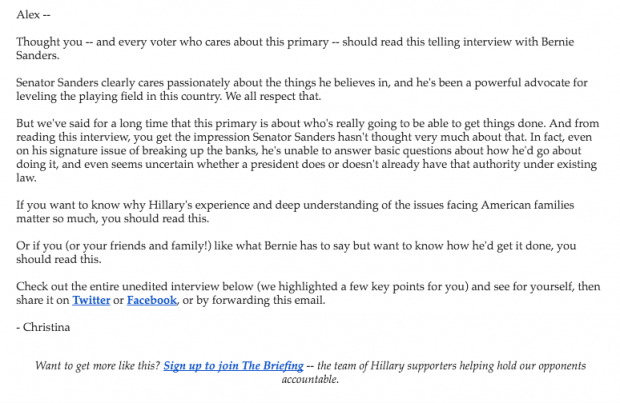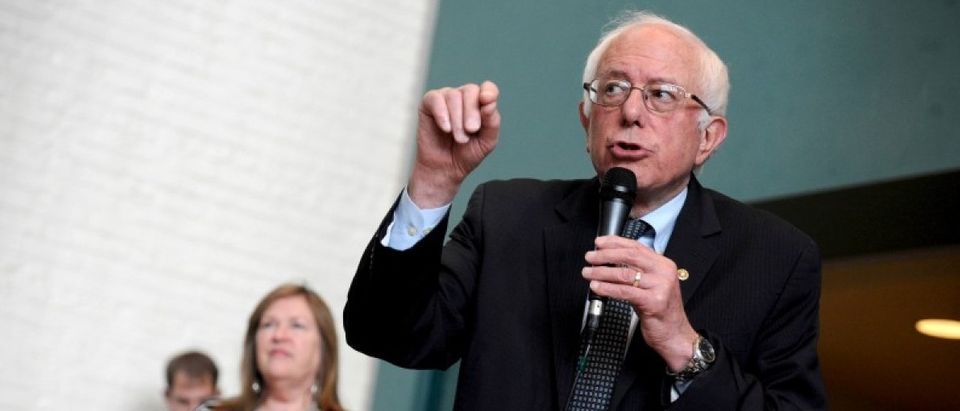Democratic 2016 hopeful Sen. Bernie Sanders has recently gained momentum in the polls, but an interview with New York Daily News published Monday may have been just disastrous enough to give front-runner Hillary Clinton the ammunition she needs to take him down.
Despite being asked questions pertaining to the major issues he’s been running on, the Vermont senator seemed to be unable to provide an intelligible response to questions ranging from the financial sector to his position on how to best handle Islamic State.
In a fundraising email sent Tuesday, Clinton highlighted some of his worst moments, including his lack of a feasible, or legal, plan to break up major banks – a major campaign platform – or a coherent answer on why Wall Street executives weren’t prosecuted for the 2008 financial crisis.

Hillary for America
Clinton said she respects Sanders’ passion, but doesn’t think he’s capable of handling the job.
“But we’ve said for a long time that this primary is about who’s really going to be able to get things done. And from reading this interview, you get the impression Senator Sanders hasn’t thought very much about that,” she wrote. “In fact, even on his signature issue of breaking up the banks, he’s unable to answer basic questions about how he’d go about doing it, and even seems uncertain whether a president does or doesn’t already have that authority under existing law.”
The former secretary of state encouraged her supporters to share the transcript on social media and donate to her campaign.
The Clinton camp went on to highlight Wednesday’s New York Daily News cover, which slams Sanders for defending gunmakers.
Currently, Sanders is trailing Clinton by 685 delegates after winning the Wisconsin primary, The Associated Press reports.
Read clips of the transcript below:
Daily News: And then, you further said that you expect to break them up within the first year of your administration. What authority do you have to do that? And how would that work? How would you break up J.P. Morgan Chase?
Sanders: Well, by the way, the idea of breaking up these banks is not an original idea. It’s an idea that some conservatives have also agreed to.
You’ve got head of, I think it’s, the Kansas City Fed, some pretty conservative guys, who understands. Let’s talk about the merit of the issue, and then talk about how we get there.
Right now, what you have are two factors. We bailed out Wall Street because the banks are too big to fail, correct? It turns out, that three out of the four largest banks are bigger today than they were when we bailed them out, when they were too-big-to-fail. That’s number one.
Number two, if you look at the six largest financial institutions of this country, their assets somewhere around $10 trillion. That is equivalent to 58% of the GDP of America. They issue two-thirds of the credit cards in this country, and about one-third of the mortgages. That is a lot of power.
And I think that if somebody, like if Teddy Roosevelt were alive today, he would look at that. Forgetting even the risk element, the bailout element, and just look at the kind of financial power that these guys have, would say that is too much power.
Daily News: Okay. Well, let’s assume that you’re correct on that point. How do you go about doing it?
Sanders: How you go about doing it is having legislation passed, or giving the authority to the secretary of treasury to determine, under Dodd-Frank, that these banks are a danger to the economy over the problem of too-big-to-fail.
Daily News: But do you think that the Fed, now, has that authority?
Sanders: Well, I don’t know if the Fed has it. But I think the administration can have it.
Daily News: How? How does a President turn to J.P. Morgan Chase, or have the Treasury turn to any of those banks and say, “Now you must do X, Y and Z?”
Sanders: Well, you do have authority under the Dodd-Frank legislation to do that, make that determination.
Daily News: You do, just by Federal Reserve fiat, you do?
Sanders: Yeah. Well, I believe you do.
Daily News: So if you look forward, a year, maybe two years, right now you have…JPMorgan has 241,000 employees. About 20,000 of them in New York. $192 billion in net assets. What happens? What do you foresee? What is J.P. Morgan in year two of…
Sanders: What I foresee is a stronger national economy. And, in fact, a stronger economy in New York State, as well. What I foresee is a financial system which actually makes affordable loans to small and medium-size businesses. Does not live as an island onto themselves concerned about their own profits. And, in fact, creating incredibly complicated financial tools, which have led us into the worst economic recession in the modern history of the United States.
Daily News: I get that point. I’m just looking at the method because, actions have reactions, right? There are pluses and minuses. So, if you push here, you may get an unintended consequence that you don’t understand. So, what I’m asking is, how can we understand? If you look at JPMorgan just as an example, or you can do Citibank, or Bank of America. What would it be? What would that institution be? Would there be a consumer bank? Where would the investing go?
Sanders: I’m not running JPMorgan Chase or Citibank.
Daily News: No. But you’d be breaking it up.
Sanders: That’s right. And that is their decision as to what they want to do and how they want to reconfigure themselves. That’s not my decision. All I am saying is that I do not want to see this country be in a position where it was in 2008, where we have to bail them out. And, in addition, I oppose that kind of concentration of ownership entirely.
You’re asking a question, which is a fair question. But let me just take your question and take it to another issue. Alright? It would be fair for you to say, “Well, Bernie, you got on there that you are strongly concerned about climate change and that we have to transform our energy system away from fossil fuel. What happens to the people in the fossil fuel industry?”
That’s a fair question. But the other part of that is if we do not address that issue the planet we’re gonna leave your kids and your grandchildren may not be a particularly healthy or habitable one. So I can’t say, if you’re saying that we’re going to break up the banks, will it have a negative consequence on some people? I suspect that it will. Will it have a positive impact on the economy in general? Yes, I think it will.
Daily News: Okay. You saw, I guess, what happened with Metropolitan Life. There was an attempt to bring them under the financial regulatory scheme, and the court said no. And what does that presage for your program?
Sanders: It’s something I have not studied, honestly, the legal implications of that.
Daily News: Okay. Staying with Wall Street, you’ve pointed out, that “not one major Wall Street executive has been prosecuted for causing the near collapse of our entire economy.” Why was that? Why did that happen? Why was there no prosecution?
Sanders: I would suspect that the answer that some would give you is that while what they did was horrific, and greedy and had a huge impact on our economy, that some suggest that…that those activities were not illegal. I disagree. And I think an aggressive attorney general would have found illegal activity.
Follow Juliegrace Brufke on Twitter
All content created by the Daily Caller News Foundation, an independent and nonpartisan newswire service, is available without charge to any legitimate news publisher that can provide a large audience. All republished articles must include our logo, our reporter’s byline and their DCNF affiliation. For any questions about our guidelines or partnering with us, please contact licensing@dailycallernewsfoundation.org.


